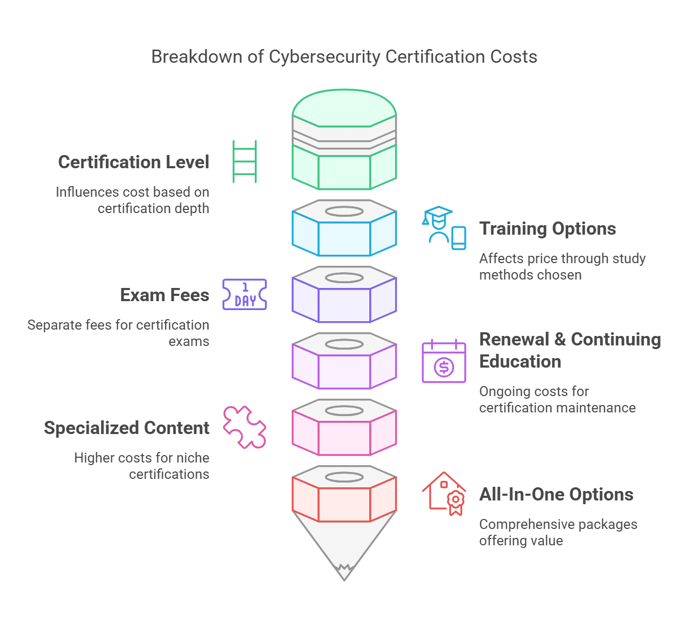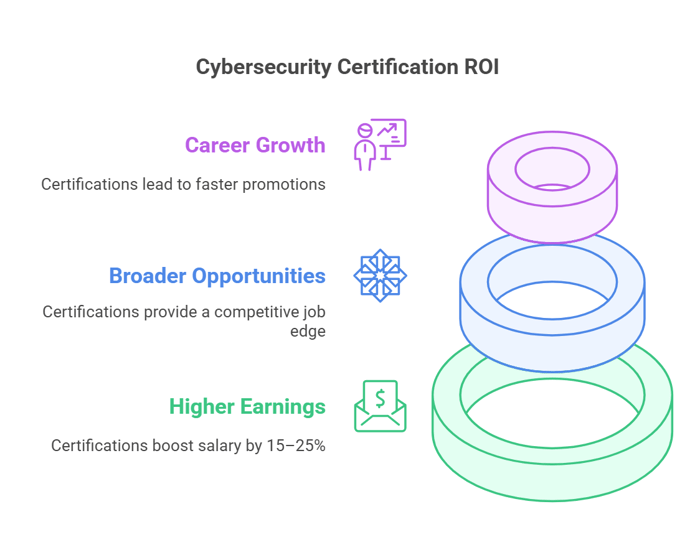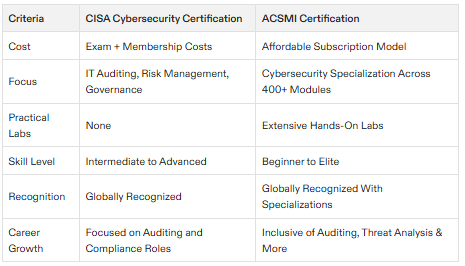Table of Contents
In today's rapidly evolving digital landscape, cybersecurity professionals are in high demand. As organizations work to protect their valuable digital assets from increasing threats, the need for skilled experts continues to grow. One of the most effective ways to enter and advance in the field is by earning cybersecurity certifications. But before you dive into the certification process, one of the most common questions is: How Much is Google Cybersecurity Certification?
Understanding the costs, benefits, and potential returns of cybersecurity certifications can help you make informed decisions about which certifications are worth pursuing and how to plan your career investment.
This guide will walk you through the key details about cybersecurity certification prices, the value these certifications offer, and how to choose one that fits your goals and budget. Whether you're just starting out or looking to specialize, this information will set you on the path to success in the cybersecurity field.
Why Are Cybersecurity Certifications Important?
Before diving into the costs, let’s first understand why certifications are so valuable in cybersecurity. With cybercrime costing businesses billions of dollars every year, hiring skilled cybersecurity professionals has become a top priority for organizations across industries. Cybersecurity certifications validate your skills, proving to employers that you’re up-to-date with the latest tools, practices, and technologies in the field.
Certifications like CompTIA Security+ or Certified Information Systems Security Professional (CISSP) are recognized as industry standards. Holding one of these certifications can significantly boost your earning potential, provide job security, and even give you the leverage to negotiate for higher positions. In a competitive field like cybersecurity, a well-recognized certification can be your ticket to accessing high-demand, lucrative job opportunities.
What Factors Influence Cybersecurity Certification Price?
The cost of obtaining a cybersecurity certification can vary greatly based on several factors. Here’s a breakdown of the key elements that influence cybersecurity certification prices:

1. Certification Level
Entry-level certifications like CompTIA Security+ are generally more affordable, ranging from $300 to $500. These certifications cover foundational topics like network security, risk management, and basic threat protection.
In contrast, advanced certifications such as CISSP typically cost upwards of $1,000. These certifications often require extensive prior experience (5 years or more) and are designed for professionals with a deeper understanding of cybersecurity practices.
2. Training Options
Some candidates prefer to study independently to minimize costs, while others opt for instructor-led training or boot camps, which provide structured guidance. Boot camps and online training courses can cost anywhere from $1,000 to $4,000, depending on the depth and duration of the program. These courses often provide additional resources like study materials, live classes, and mentorship, but they come with a higher price tag.
3. Exam Fees
Nearly every certification comes with its own exam fee. For example:
CompTIA certifications typically cost around $349 per exam.
Certified Ethical Hacker (CEH) exams are priced at $1,199.
CISSP exams cost around $749.
These fees are separate from any study materials or training costs, and the price can vary depending on the certification provider and your location.
4. Renewal & Continuing Education
Many cybersecurity certifications require periodic renewal to ensure professionals stay up-to-date with the latest trends and technologies. For example, maintaining a CISSP certification requires an annual renewal fee of $125. Some certifications also require ongoing continuing education (CE) credits, which can incur additional costs over time.
5. Specialized Content
Advanced or specialized certifications such as those for penetration testing or cloud security may cost more due to the specialized content and expertise required. These certifications require deeper knowledge and hands-on skills in niche areas, leading to higher training and exam fees.
6. All-In-One Options
Some comprehensive programs like the ACSMI Cybersecurity Certification bundle multiple resources into one package. These certifications typically include over 400 modules and practical labs to bridge the gap between theoretical learning and real-world experience. While the upfront cost may be higher, certifications like these offer excellent value by providing a complete learning experience with flexible learning options.
Understanding how these factors influence costs will help you plan your budget and decide which certifications best fit your career goals and financial resources.
Types of Cybersecurity Certifications and Their Costs
To give you a clearer idea of what to expect, here’s an overview of popular cybersecurity certifications at different levels and their associated costs:
CompTIA Security+ (Entry-Level): $300–$500
Certified Ethical Hacker (CEH) (Intermediate-Level): $1,199
Certified Information Systems Security Professional (CISSP) (Advanced-Level): $749 (Exam Fee), $125 (Annual Renewal)
Certified Cloud Security Professional (CCSP) (Advanced-Level): $599–$1,000
Certified Penetration Tester (OSCP) (Advanced-Level): $800–$1,500
These certifications vary not only in price but also in the depth of knowledge required. When choosing a certification, consider both the initial cost and the long-term value it can bring to your career.
Remember, a more expensive certification may offer greater returns in terms of career growth and earning potential. However, entry-level certifications are a great way to get started in the field, especially if you’re on a budget.
What Is the ROI of Cybersecurity Certifications?
Cybersecurity certifications require an upfront investment, but the returns can be significant. Here's how you can expect to benefit from the money spent on certifications:

1. Higher Earnings
Certified professionals typically earn 15–25% more than their non-certified peers. For example, an entry-level Security Analyst can start with a salary of $70,000 annually, while CISSP-certified professionals can command salaries of $120,000 or more.
Certifications significantly increase your earning potential by validating your expertise and making you a more attractive candidate to employers.
2. Broader Job Opportunities
Having a certification on your resume gives you a competitive edge when applying for jobs. Many employers specifically look for candidates with certifications, especially when filling specialized roles like Penetration Tester, SOC Analyst, or Security Architect. These certifications help you stand out and demonstrate that you have the skills and knowledge needed to succeed in these high-demand positions.
3. Career Growth
Certifications demonstrate your commitment to continuous learning and professional development. This can lead to faster career advancement and promotions. Many individuals who earn advanced certifications, like CISSP, move into leadership roles or specialized positions, propelling their careers forward.
Overall, when viewed as a long-term investment, the ROI of cybersecurity certifications is often substantial, both financially and professionally.
How to Choose the Right Certification
Choosing the right certification can feel overwhelming due to the wide range of options available. To simplify your decision-making process, consider the following:

1. Your Experience Level
If you're just starting out in cybersecurity, go for entry-level certifications like CompTIA Security+. These certifications provide a solid foundation in cybersecurity principles. For more experienced professionals, certifications like CISSP or specialized options may be more appropriate.
2. Career Goals
Consider your long-term career aspirations and how the certification will align with them. If you're aiming for a specific niche, such as cloud security or penetration testing, look for certifications tailored to those roles.
3. Budget
Make sure to calculate the total cost of certification, including exam fees, training, and renewal costs. Consider whether a bundle, like the ACSMI certification program, offers better value by providing comprehensive training and resources at a reasonable price.
4. Industry Demand
Research which certifications are in demand in your region or field. Some certifications are more recognized or requested by employers in specific industries or geographic areas.
Final Thoughts on Cybersecurity Certification Price
Understanding the costs associated with cybersecurity certifications is essential for planning your career in the field. From entry-level certifications like CompTIA Security+ to advanced certifications like CISSP and OSCP, there’s a wide range of options to suit your budget and career aspirations.
Certifications validate your skills, boost your earning potential, and ensure you're competitive in a fast-evolving industry. Programs like ACSMI’s Cybersecurity Certification offer unmatched value with over 400 modules, making it easy to tailor your learning to your career goals.
Investing in the right certification today sets you up for success in one of the most in-demand and rewarding fields in tech. Take the next step—your future in cybersecurity starts now!
FAQ
How much do cybersecurity certifications cost?
Certification costs range from $300 for basic certifications like CompTIA Security+ to over $1,000 for advanced certifications like CISSP. Additional costs for training, study materials, and renewals may also apply.
Are cybersecurity certifications worth the cost?
Yes, cybersecurity certifications significantly enhance your earning potential, improve career prospects, and validate your expertise to employers.
Can I reduce certification costs?
You can reduce costs by opting for self-study, employer-sponsored training, or taking advantage of free online resources.
What’s the best certification for beginners?
CompTIA Security+ is a great entry-level certification. It covers basic concepts like network security and risk management and is widely recognized in the industry.
What challenges are associated with certification?
Time commitment, renewal fees, and the upfront cost can be challenging. However, the long-term benefits—both financial and career-related—often outweigh these challenges.





